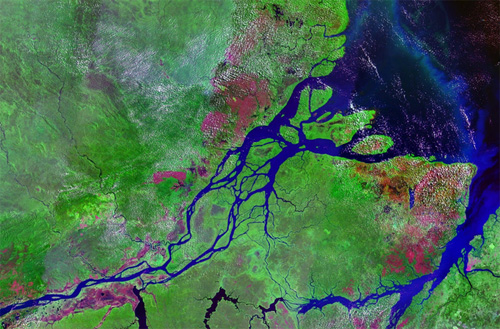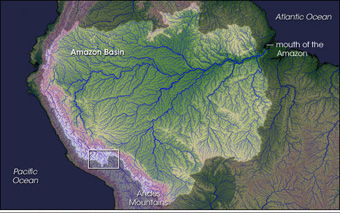Navigation
SIWI to Host UNESCO Centre in Sweden with Focus on Transboundary Water Cooperation
United Nations Educational, Scientific and Cultural Organization (UNESCO), decided yesterday to establish a research center in Sweden with a focus on international water issues. With its focus on transboundary water cooperation, the center will be one of a kind. The center will be run by the Stockholm International Water Institute (SIWI) in collaboration with Uppsala University and the University of Gothenburg.
 The Amazon River in South America is generally regarded as the second longest river in the world and is: by far the largest by water flow with an average discharge of about 209,000 cubic meters per second. The Amazon runs through Brazil, Columbia and Peru. Text and image courtesy of Wikipedia
The Amazon River in South America is generally regarded as the second longest river in the world and is: by far the largest by water flow with an average discharge of about 209,000 cubic meters per second. The Amazon runs through Brazil, Columbia and Peru. Text and image courtesy of Wikipedia
United Nations Educational, Scientific and Cultural Organization (UNESCO), decided yesterday to establish a research center in Sweden with a focus on international water issues. With its focus on transboundary water cooperation, the center will be one of a kind. The center will be run by the Stockholm International Water Institute (SIWI) in collaboration with Uppsala University and the University of Gothenburg.
 Satellite image of mouths of Amazon River in Brazil, with Marajó Island in the center,: and the cities (in red) of Macapá (left) and Belém (right). Text courtesy of Wikipedia. Image courtesy of NASA.The majority of the world's countries share water resources in some form, such as rivers and lakes. Consequently cooperation with other States on this vital resource is essential. The Swedish UNESCO Centre will focus on equitable water cooperation and aims to develop research and knowledge on transboundary water resource management. The Centre, which will be located at SIWI, will also concentrate on how to establish and develop effective water partnerships despite contexts of political conflict.
Satellite image of mouths of Amazon River in Brazil, with Marajó Island in the center,: and the cities (in red) of Macapá (left) and Belém (right). Text courtesy of Wikipedia. Image courtesy of NASA.The majority of the world's countries share water resources in some form, such as rivers and lakes. Consequently cooperation with other States on this vital resource is essential. The Swedish UNESCO Centre will focus on equitable water cooperation and aims to develop research and knowledge on transboundary water resource management. The Centre, which will be located at SIWI, will also concentrate on how to establish and develop effective water partnerships despite contexts of political conflict.
The global population is growing. By 2050 we expect to be nine billion people. However, we are unable to increase the quantity of water resources available to us. Consequently, it is important to ensure we create good cooperation mechanisms around water for the future, and especially in relation to transboundary waters. Together with the universities of Uppsala and Gothenburg, we celebrate the decision to establish a UNESCO Centre on water cooperation in Sweden, says SIWI’s CEO Torgny Holmgren.
_0.jpg) View of the Mekong River at Luang Prabang in Laos. (late August 2009). From the Tibetan Plateau this river runs through: China's Yunnan province, Burma (Myanmar), Laos, Thailand, Cambodia and Vietnam. Photograph by Allie Caulfield. Text courtesy of Wikipedia
View of the Mekong River at Luang Prabang in Laos. (late August 2009). From the Tibetan Plateau this river runs through: China's Yunnan province, Burma (Myanmar), Laos, Thailand, Cambodia and Vietnam. Photograph by Allie Caulfield. Text courtesy of Wikipedia
81 UNESCO Centre’s exist in different parts of the world, with 18 of them focusing on water related issues.
This is the first time that a UNESCO Centre has been established in Sweden and the first time a Centre will focus on transboundary cooperation. This new UNESCO Centre will help Sweden deepen its involvement in water issues and disseminate Swedish research in this area. The focus will draw from the strong tradition of research on water conflict and cooperation that exists in Sweden today.
Access to clean water is a critical global issue for the future.
The establishment of a UNESCO Centre for Water Cooperation in Sweden will assist in increasing UNESCO capacities on water cooperation and provide concrete support in regions where conflict over shared waters is strong, says Inger Davidson , president of the Swedish National Commission for UNESCO.
This news is from Stockholm International Water Institute (SIWI) 14 November 2013. Published on the Horizon International Solutions Site. On the 14th of November, 2013.
About UNESCO:
UNESCO, the United Nations Educational, Scientific and Cultural Organization, and was established with the goal of creating peace through increased cooperation between countries. UNESCO was formed in 1946 and currently has 195 member countries. Sweden has been a member since 1950.
UNESCO Water Centres:
“The water-related centres under the auspices of UNESCO (category 2) work on relevant thematic and geographic priorities in their areas of expertise. Since Member States have realized the potential of these centres, the network has been rapidly expanding.”
Read about the other Centres at http://www.unesco.org/new/en/natural-sciences/environment/water/ihp/water-centres/
About the Stockholm International Water Institute (SIWI)
SIWI is a policy institute that develops knowledge and informs decision-makers about smart water policy and sustainable development. SIWI research and acts as an advisor in a number of water-related areas. The Institute organizes the World Water Week in Stockholm will host the Stockholm Water Prize, Stockholm Junior Water Prize and the Stockholm Industry Water Award.
Search
Latest articles
Agriculture
- World Water Week: Healthy ecosystems essential to human health: from coronavirus to malnutrition Online session Wednesday 24 August 17:00-18:20
- World Water Week: Healthy ecosystems essential to human health: from coronavirus to malnutrition Online session Wednesday 24 August 17:00-18:20
Air Pollution
- "Water and Sanitation-Related Diseases and the Changing Environment: Challenges, Interventions, and Preventive Measures" Volume 2 Is Now Available
- Global Innovation Exchange Co-Created by Horizon International, USAID, Bill and Melinda Gates Foundation and Others
Biodiversity
- It is time for international mobilization against climate change
- World Water Week: Healthy ecosystems essential to human health: from coronavirus to malnutrition Online session Wednesday 24 August 17:00-18:20
Desertification
- World Water Week: Healthy ecosystems essential to human health: from coronavirus to malnutrition Online session Wednesday 24 August 17:00-18:20
- UN Food Systems Summit Receives Over 1,200 Ideas to Help Meet Sustainable Development Goals
Endangered Species
- Mangrove Action Project Collaborates to Restore and Preserve Mangrove Ecosystems
- Coral Research in Palau offers a “Glimmer of Hope”
Energy
- Global Innovation Exchange Co-Created by Horizon International, USAID, Bill and Melinda Gates Foundation and Others
- Wildlife Preservation in Southeast Nova Scotia
Exhibits
- Global Innovation Exchange Co-Created by Horizon International, USAID, Bill and Melinda Gates Foundation and Others
- Coral Reefs
Forests
- NASA Satellites Reveal Major Shifts in Global Freshwater Updated June 2020
- Global Innovation Exchange Co-Created by Horizon International, USAID, Bill and Melinda Gates Foundation and Others
Global Climate Change
- It is time for international mobilization against climate change
- It is time for international mobilization against climate change
Global Health
- World Water Week: Healthy ecosystems essential to human health: from coronavirus to malnutrition Online session Wednesday 24 August 17:00-18:20
- More than 400 schoolgirls, family and teachers rescued from Afghanistan by small coalition
Industry
- "Water and Sanitation-Related Diseases and the Changing Environment: Challenges, Interventions, and Preventive Measures" Volume 2 Is Now Available
- Global Innovation Exchange Co-Created by Horizon International, USAID, Bill and Melinda Gates Foundation and Others
Natural Disaster Relief
- STOP ATTACKS ON HEALTH CARE IN UKRAINE
- Global Innovation Exchange Co-Created by Horizon International, USAID, Bill and Melinda Gates Foundation and Others
News and Special Reports
- World Water Week: Healthy ecosystems essential to human health: from coronavirus to malnutrition Online session Wednesday 24 August 17:00-18:20
- STOP ATTACKS ON HEALTH CARE IN UKRAINE
Oceans, Coral Reefs
- World Water Week: Healthy ecosystems essential to human health: from coronavirus to malnutrition Online session Wednesday 24 August 17:00-18:20
- Mangrove Action Project Collaborates to Restore and Preserve Mangrove Ecosystems
Pollution
- Zakaria Ouedraogo of Burkina Faso Produces Film “Nzoue Fiyen: Water Not Drinkable”
- "Water and Sanitation-Related Diseases and the Changing Environment: Challenges, Interventions, and Preventive Measures" Volume 2 Is Now Available
Population
- "Water and Sanitation-Related Diseases and the Changing Environment: Challenges, Interventions, and Preventive Measures" Volume 2 Is Now Available
- "Water and Sanitation-Related Diseases and the Changing Environment: Challenges, Interventions, and Preventive Measures" Volume 2 Is Now Available
Public Health
- Honouring the visionary behind India’s sanitation revolution
- Honouring the visionary behind India’s sanitation revolution
Rivers
- World Water Week: Healthy ecosystems essential to human health: from coronavirus to malnutrition Online session Wednesday 24 August 17:00-18:20
- Mangrove Action Project Collaborates to Restore and Preserve Mangrove Ecosystems
Sanitation
- Honouring the visionary behind India’s sanitation revolution
- Honouring the visionary behind India’s sanitation revolution
Toxic Chemicals
- "Water and Sanitation-Related Diseases and the Changing Environment: Challenges, Interventions, and Preventive Measures" Volume 2 Is Now Available
- Actions to Prevent Polluted Drinking Water in the United States
Transportation
- "Water and Sanitation-Related Diseases and the Changing Environment: Challenges, Interventions, and Preventive Measures" Volume 2 Is Now Available
- Urbanization Provides Opportunities for Transition to a Green Economy, Says New Report
Waste Management
- Honouring the visionary behind India’s sanitation revolution
- Honouring the visionary behind India’s sanitation revolution
Water
- Honouring the visionary behind India’s sanitation revolution
- Honouring the visionary behind India’s sanitation revolution
Water and Sanitation
- Honouring the visionary behind India’s sanitation revolution
- Honouring the visionary behind India’s sanitation revolution

